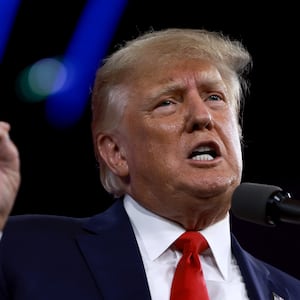When the Federal Elections Commission rejected a recent Freedom of Information Act request related to Donald Trump’s “recount” expenses after the 2020 election, the campaign watchdog had a conspicuous reason for turning down the petition: Trump’s political spending after he left the White House is currently the subject of an FEC enforcement matter.
According to agency records obtained by The Daily Beast, the FEC rejected a FOIA request—filed Dec. 20 by a nonpartisan research group that shared the documents on condition of anonymity—because those records may involve an active inquiry.
“To the extent that the records you requested concern an ongoing FEC enforcement matter, we can neither confirm nor deny that any such records exist,” the agency’s FOIA attorney wrote in the letter, which was shared with The Daily Beast.
The request asked the agency for documents and communications related to a major Trump vendor that has received millions in campaign “recount” funds for seemingly unrelated services—including document production for subpoenas from the congressional COVID subcommittee.
Dan Weiner, director of elections and government at the Brennan Center and a former attorney with the FEC, told The Daily Beast that while the response itself isn’t indicative of any stage of inquiry—“readers shouldn’t get excited”—the particular issue is serious.
“The FEC could be indicating one of many different scenarios,” Weiner said, explaining that the agency opens enforcement matters under a range of prompts, from publicly generated complaints to federal referrals to internal decisions. More often than not, enforcement matters resolve in a whimper—a conspicuously glaring pattern when it comes to Trump.
(The FEC declined to comment for this article, citing the same policy laid out in the FOIA reply.)
But Weiner joined other campaign finance experts in noting that the news comes with critical context, as suspicious fundraising and spending for so-called “recount” accounts has begun drawing greater scrutiny to what Weiner described as a “culture of impunity.”
“Recount fundraising is a particularly wild west area of campaign finance, where the absence of any visible guidelines has led to some fairly abusive behavior,” Weiner said, pointing to Trump’s recount spending as a glaring example.
That spending—including payments through possible shell vendors—is now reportedly a target of special counsel Jack Smith’s investigation. But Trump isn’t alone. Other “recount” funds have recently drawn attention, including those belonging to Rep. George Santos (R-NY) and former senatorial hopeful Herschel Walker, who received a notice from the FEC after shuffling tens of thousands of dollars in donor funds to a “recount” that was never in the cards.
Transparency advocates say those misuses of donor money expose a loophole in a lightly regulated area of election law. Federal law allows certain political committees to maintain an extra account where they can raise and spend money to pay costs associated with recounts, which can give rise to unforeseen expenses. But, these critics say, a pattern seems to be emerging where candidates exploit the loose rules, treating “recount” accounts as slush funds or repositories for excess contributions.
Weiner pointed out that recount fundraising, left unchecked, could also create perverse incentives for democracy.
“One thing that’s particularly concerning is where fundraising can become a vehicle for spreading lies about election denial, and where you also have election denial itself as a fundraising vehicle for losing candidates,” he said. “These accounts are increasingly being operated within a culture of impunity, and there are some common-sense changes the FEC will need to make.”
Trump famously raised tens of millions of dollars from supporters on the back of his false claims about the 2020 election. And he spent “recount” cash lavishly after he left office, when he converted his 2020 campaign committee to a PAC called “Make America Great Again PAC.”
In fact, MAGA PAC’s highest paid vendor over the last two years received the majority of its payments from the “recount” fund. That would be “2M Document Management and Imaging, LLC,” a firm created about two months after Trump left office, and which handled document production and review in connection with congressional subpoenas.
It’s also the same company that was the subject of the FOIA request.
Essentially, the FOIA request shines a light on an inquiry involving a specific Trump vendor that does not appear by name in known FEC complaints, or Google search results involving activity.
But the fact that 2M’s payments are part of an enforcement matter doesn’t necessarily mean the company itself did anything wrong. The focus could be on MAGA PAC’s raising and spending, for instance, with 2M simply being a vendor, or one of many vendors, that received payments.
But it’s a lot of payments.
All told, 2M has banked more than $6.2 million spread across 40 MAGA PAC payments—all on the backs of Trump donors—with more than two-thirds of that amount, more than $4.6 million, coming out of the “recount” fund. The total represents 33 percent of the $19 million that MAGA PAC has spent between March 30, 2021, and Dec. 30, 2022. And no other political committee has ever paid the company, according to federal records.
The FOIA request asked the FEC for all documents, communications, and attachments within the agency that mention 2M—as well as all communications between FEC employees and anyone with an email address at that company—created between March 2021 and the end of 2022. The FEC replied that it had no responsive documents, citing its enforcement policy.
As laid out in the “Follow the Money” appendix to the Jan. 6 House Select Committee’s final report, 2M was created on March 24, 2021—two months after Trump left office, and more than four months after the election was called. Six days later, it received its first Trump paycheck—a $650,000 retainer for what the PAC described as “Recount: Research Consulting.”
However, as the firm’s founder Matthew Clarke told House investigators, the company was initially retained to handle work that would appear entirely unrelated to the campaign, let alone to a recount.
According to Clarke, the “vast majority” of 2M’s work for Trump involved document production in response to congressional subpoenas from the Jan. 6 committee and COVID committee. And for the first two or three months, he said, it was only COVID. Clarke also confirmed to investigators that 2M was still doing COVID and Jan. 6 work as of the date of his interview—Aug. 4, 2022.
That same day, MAGA PAC paid 2M $111,048.76 for “Recount: Research Consulting,” FEC records show. The firm received one more “recount” payment after the interview, for $318 the next month.
The Daily Beast sent questions to Clarke by text message and email, but received no reply. Campaign finance experts, however, called these actions an “abuse” of recount funds.
Saurav Ghosh, director of federal reform at nonprofit watchdog Campaign Legal Center—which recently published an article about Trump’s recount activity—called on the FEC to issue clear rules.
“Recount funds are not supposed to be spent on subpoena responses in connection with congressional investigations into COVID-19 and the January 6 attack,” Ghosh told The Daily Beast. “This type of abuse is a growing problem that the Federal Election Commission urgently needs to address.”
Brendan Fischer, deputy executive director of watchdog group Documented, said the committee’s report details “a stunning abuse of recount funds,” which he said the FEC should be investigating.
“Trump began fundraising for his recount account the day after the 2020 election, and quickly raised a ton of money with ‘Stop the Steal’ appeals,” Fischer said. While Trump put some of his recount donations towards election challenges, Fischer noted he had millions of dollars left.
“So it appears that the Trump campaign used its recount account as a slush fund to pay for a wide range of expenses, and continued doing so for years after all recounts had concluded,” he observed.
Jordan Libowitz, of Citizens for Responsibility and Ethics in Washington, told The Daily Beast that campaigns generally try to spend all their money by Election Day—“you don’t want to lose and have a million bucks left over”—and that recount funds have a purpose.
“While recounts rarely change the outcome of an election, they can be expensive and can go on for a long time—paying lawyers, staff, ballot counts, all kinds of things,” Libowitz said. “But if you’re transferring money when you don’t expect a recount or there isn’t one, there’s a question of what you’re doing with that money. You might expect that a candidate would give that money back to their donors, but the sad truth is that if you give politicians money, they’re going to hold onto it as long as they can.”
Fischer noted that he couldn’t see “even a remote connection between the Trump White House’s COVID response and the Trump campaign’s efforts to contest the 2020 election.”
Clarke, who is also a lawyer, apparently agreed.
“We didn’t do any, like, recount work,” he told investigators in his interview.
He later told them his company was “never retained” to do a recount. “If something was classified as a recount, I haven’t the slightest idea,” he said.
Clarke did say, however, that many of the 10 or so Jan. 6 witnesses that 2M helped during the course of its Trump work did have connections to the campaign.
But that came later. Initially, he said, 2M was brought on specifically to handle the COVID subpoenas.
“How we ended up in this was the former administration was responding to—there were requests made from the House Oversight committee, I guess, on COVID, or the White House response to COVID that they were getting from [the National Archives and Records Administration],” Clarke said.
He explained that 2M would “assist [NARA] with the technology and the hosting and consulting and review” regarding the massive document requests, specifically “looking at documents and trying to determine” whether they might be off-limits due to executive or attorney-client privilege.
NARA, Clarke recounted, was swamped by the requests—sometimes tens of thousands of pages at a time—and “grateful” for the expertise of his team, which threw between five and 20 people at the work at a time, depending on volume. (Clarke said his firm never worked with NARA’s general counsel on the requests.)
A NARA spokesperson did not immediately reply to a request for comment.
Clarke claimed that 2M landed the MAGA PAC contract via his pre-existing relationship with former Trump White House lawyer Eric Herschmann, who connected Clarke to Trump’s legal team after Trump left office. Ultimately, Clarke said, 2M was retained by a law firm founded by Trump attorneys called Elections LLC, with MAGA PAC fielding the costs as a third party. The firm would communicate with a handful of Trump officials, Clarke said, most notably bookkeeper Sean Dollman, attorney and Elections LLC co-founder Justin Clark, and occasionally former deputy White House counsel Pat Philbin.
“There were a couple times where we had documents that we thought maybe we didn’t have authorization to look at,” Clarke said. They would then call in Philbin to review.
In at least one instance, Clarke recalled, the 2M team came across a document marked classified. They immediately went “pencils down,” he said, and stopped all work until the issue was resolved.
House investigators keyed in on curiosities in MAGA PAC’s expenses to 2M, most specifically the way the company would often receive two payments on the same day—one large, one small. Clarke said that he had no real insight, chalking it up to unknown billing decisions within the Trump operation.
But Clarke acknowledged that, as the Jan. 6 investigation steamed along, 2M handled mountains of document production and reviews on behalf of a number of congressional witnesses—with those costs footed by MAGA PAC.
“Donald Trump has never done anything on his own without expecting something back. He even used his charity for his own purposes, and that money wasn’t even coming from him,” Libowitz said. “So this isn’t a favor; this is a payment.”
Some of that money, however, went right down the drain. When it came to executive privilege, for instance, 2M’s work was essentially moot.
“As I understand it, the current administration gets to veto all that, and then it all goes out the door anyway,” Clarke said.









